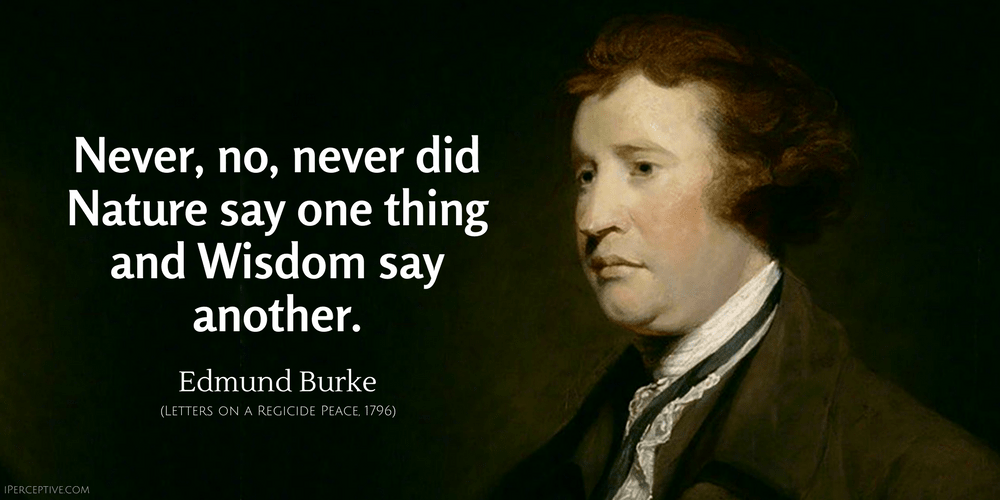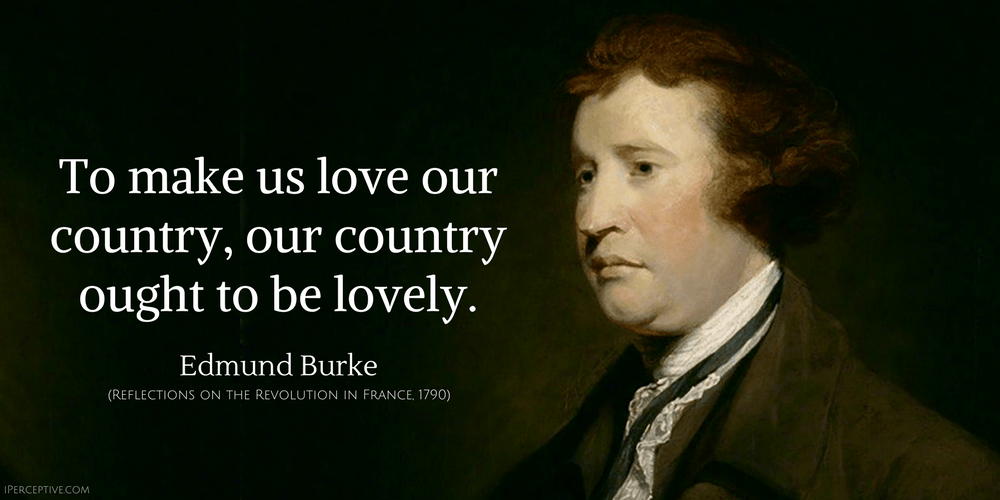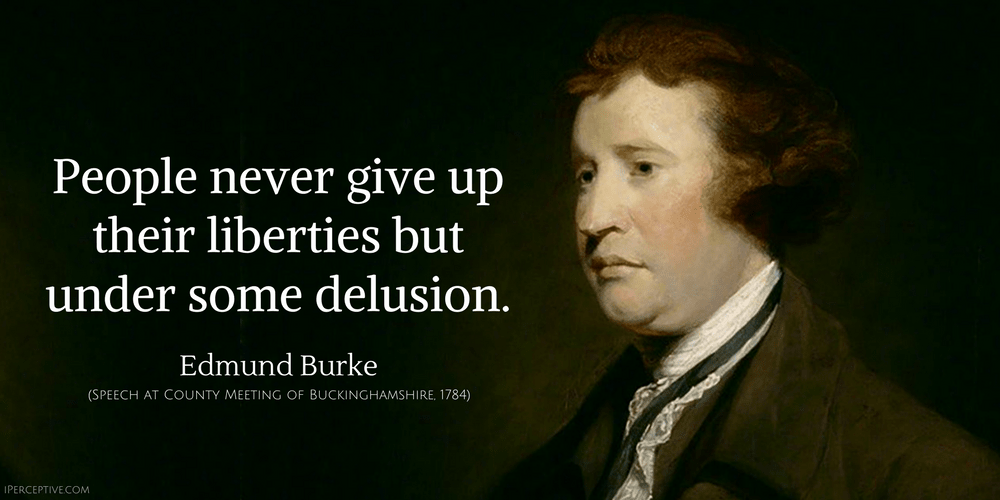Edmund Burke Quotes

Never, no, never did Nature say one thing and Wisdom say another.
Flattery corrupts both the receiver and the giver.
Good order is the foundation of all things.
The march of the human mind is slow.
To read without reflecting is like eating without digesting.
Our patience will achieve more than our force.
Facts are to the mind what food is to the body.
Tyrants seldom want pretexts.
Nobody made a greater mistake than he who did nothing because he could only do a little.
Ambition can creep as well as soar.
It is not what a lawyer tells me I may do; but what humanity, reason, and justice tell me I ought to do.
We must all obey the great law of change. It is the most powerful law of nature.
If we command our wealth, we shall be rich and free; if our wealth commands us, we are poor indeed.
Bad laws are the worst sort of tyranny.
People will not look forward to posterity, who never look backward to their ancestors.

To make us love our country, our country ought to be lovely.
Toleration is good for all, or it is good for none.
In a democracy, the majority of the citizens is capable of exercising the most cruel oppressions upon the minority.
When any work seems to have required immense force and labor to effect it, the idea is grand.
To drive men from independence to live on alms, is itself great cruelty.
Superstition is the religion of feeble minds.
The greater the power, the more dangerous the abuse.
Make the Revolution a parent of settlement, and not a nursery of future revolutions.
One that confounds good and evil is an enemy to good.
It is the nature of all greatness not to be exact.
Gentlemen, the melancholy event of yesterday reads to us an awful lesson against being too much troubled about any of the objects of ordinary ambition. The worthy gentleman, who has been snatched from us at the moment of the election, and in the middle of contest, whilst his desires were as warm, and his hopes as eager as ours, has feelingly told us, what shadows we are, and what shadows we pursue.
I venture to say no war can be long carried on against the will of the people.
Example is the school of mankind, and they will learn at no other.
Whenever a separation is made between liberty and justice, neither, in my opinion, is safe.
By hating vices too much, they come to love men too little.
There is a boundary to men's passions when they act from feelings; but none when they are under the influence of imagination.
Poetry is the art of substantiating shadows, and of lending existence to nothing.
Depend upon it, that the lovers of freedom will be free.
The most important of all revolutions, a revolution in sentiments, manners and moral opinions.
People crushed by laws, have no hope but to evade power. If the laws are their enemies, they will be enemies to the law; and those who have most to hope and nothing to lose will always be dangerous.
Rudeness is the weak man’s imitation of strength.
Custom reconciles us to everything.
Men are qualified for civil liberty in exact proportion to their disposition to put moral chains on their own appetites. Society cannot exist unless a controlling power upon will and appetite be placed somewhere, and the less of it there is within, the more there is without. It is ordained in the eternal constitution of things that men of intemperate minds cannot be free. Their passions forge their fetters.
It is, generally, in the season of prosperity that men discover their real temper, principles, and designs.
There is, however, a limit at which forbearance ceases to be a virtue.
He that struggles with us strengthens our nerves, and sharpens our skill. Our antagonist is our helper.
A great profusion of things, which are splendid or valuable in themselves, is magnificent. The starry heaven, though it occurs so very frequently to our view, never fails to excite an idea of grandeur. This cannot be owing to the stars themselves, separately considered. The number is certainly the cause.
Never despair, but if you do, work on in despair.
Falsehood is a perennial spring.
There is no safety for honest men but by believing all possible evil of evil men.
Nothing turns out to be so oppressive and unjust as a feeble government.
Beauty in distress is much the most affecting beauty.
A disposition to preserve, and an ability to improve, taken together, would be my standard of a statesman.

People never give up their liberties but under some delusion.
The use of force alone is but temporary. It may subdue for the moment; but it does not remove the necessity of subduing again: and a nation is not governed, which is perpetually to be conquered.
And having looked to Government for bread, on the very first scarcity they will turn and bite the hand that fed them.
The true danger is when liberty is nibbled away, for expedients, and by parts.
Laws, like houses, lean on one another.
But what is liberty without wisdom, and without virtue? It is the greatest of all possible evils; for it is folly, vice, and madness, without tuition or restraint.
The first and simplest emotion which we discover in the human mind, is curiosity.
Woman is not made to be the admiration of all, but the happiness of one.
If the people are happy, united, wealthy, and powerful, we presume the rest. We conclude that to be good from whence good is derived.
By gnawing through a dike, even a rat may drown a nation.
If you can be well without health, you may be happy without virtue.
There is a boundary to men's passions when they act from feelings; but none when they are under the influence of imagination.
You can never plan the future by the past.
All that is necessary for the triumph of evil is that good men do nothing.
Variant: All that's necessary for the forces of evil to win in the world is for enough good men to do nothing.
It is ordained in the eternal constitution of things, that men of intemperate minds cannot be free. Their passions forge their fetters.
Under the pressure of the cares and sorrows of our mortal condition, men have at all times, and in all countries, called in some physical aid to their moral consolations - wine, beer, opium, brandy, or tobacco.
No passion so effectually robs the mind of all its powers of acting and reasoning as fear.

